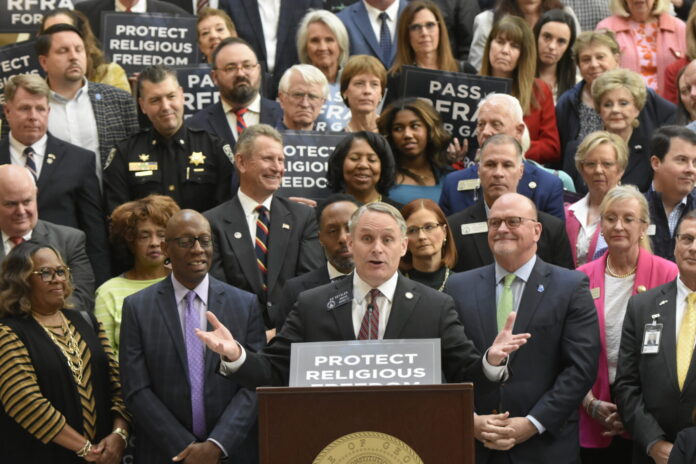
ATLANTA (Georgia Recorder) — With the 2025 legislative session set to expire at the end of the week, supporters of a controversial “religious freedom” bill gathered in the Capitol to call for its final passage.
Acworth Republican Sen. Ed Setzler’s Senate Bill 36, also known as the Georgia Religious Freedom Restoration Act, or RFRA, has passed the Senate and a House committee. Passage through the full House would send it to Gov. Brian Kemp’s desk.
“Every Georgian should be free to exercise their faith without unfair federal, state, and local government intrusion,” Setzler said. “Senate Bill 36, the Religious Freedom Restoration Act, protects ordinary people from unfair state and local government intrusion by exactly mirroring the language from the federal RFRA law that protects people from unfair federal government intrusion.”

Setzler said 39 states have RFRA laws on the books and characterizes his bill as a way to protect religious liberties at the state and local level the same way the First Amendment protects them at the federal level. He gave the example of a Native American boy whose school tried to make him cut his long braided hair that was part of his religious and cultural heritage. Setzler said the boy’s family won a lawsuit under their state’s RFRA law.
Opponents say without statewide civil rights protections, a RFRA law would allow religious Georgians to discriminate against LGBTQ people or members of religious minorities.
“Cloaked in religion, Georgians can deny thousands of people the ability to live the American dream,” said Atlanta Democratic Sen. RaShaun Kemp, who is gay, in a statement. “The truth is, these bills aren’t helping Georgians. That is why we fight them. Because we know bills like this don’t do anything but drive a wedge between neighbors and harm minorities.”

Rep. Esther Panitch, a Sandy Springs Democrat and the state’s only currently serving Jewish state legislator took issue with Setzler when he said the bill would mostly protect minority religions rather than evangelical Christianity.
“That’s a lie,” she said. “Every time I try to stand up for asking for religious liberty for Jews and how it would be affected by a state RFRA, they essentially say that my religious liberties don’t matter.”
“For example, in Judaism, life does not begin at conception,” she said. “Just look at Israel. (Abortion) is legal, and it’s accessible in the Jewish state, but if I need one, I can’t get one. And so, in this state, my religious liberties are being degraded in favor of a Christian majority.”
Panitch pointed to Indiana, where the state court of appeals ruled last year that the right to an abortion can be protected under that state’s RFRA law.
“RFRA is now being used in Indiana to create religious exemptions for Jewish women, so on some level, if it passes no matter my objections, I’m going to really enjoy when RFRA gets used to invalidate the heartbeat bill.”
Panitch was referencing Georgia’s abortion law, sponsored by Setzler in 2019 when he was in the state House.
Panitch said she had asked House leadership not to let the bill come to the floor, but influential conservatives are putting pressure on the House to move forward on RFRA.

Cole Muzio, head of the evangelical Frontline lobbying firm, gave lawmakers a not-so-subtle message at Setzler’s rally.
“As we look ahead to next year, whether it’s primary season or general election season, we have long memories and we have expectations, and we expect this to be done now,” he said.
Similar bills have fallen short in the Georgia Legislature in recent years, but Setzler said he is confident the House will vote on and pass SB 36 this year.
“I would welcome a large bipartisan vote, but I know we’ve got the votes on the floor of the House to do this; it’s just a matter of making the decision that we need to do it this year,” he said. “I thank the leadership that’s deliberating on this carefully; they’re friends of mine, and they believe in this deeply. It’s a matter of timing. I think it’s important to recognize that timing, respectfully, is now.”







